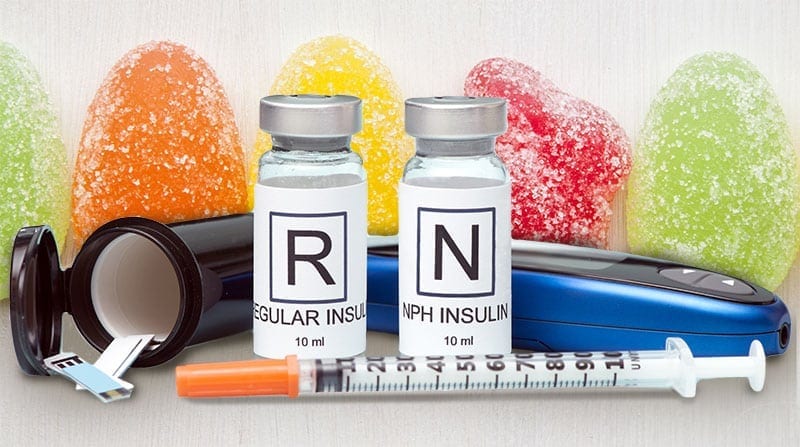Patients frequently want to know “what causes my blood sugars to go up and down even though I am doing the same things every day.” Patients will eat similar foods in the same quantities daily and hope their blood sugars will stay at the same level. Although eating does have a huge impact on blood sugars, there are other causes as well. Let’s look at some of the other possible reasons why your blood sugars may vary from day to day.
Illness or Physical Stress
Having a urinary tract, lung, or skin infection, as well as the flu or gum disease can make your blood sugars fluctuate. Often patients do not realize there is an underlying infection until their blood sugars soar. If you see your blood glucose numbers climbing for no apparent reason you should take your temperature and check with your physician to rule out possible infection. Chronic unrelieved pain or fibromyalgia may also cause blood sugar changes. Find ways to resolve these issues by researching physical therapy, chiropractic medicine, acupuncture, yoga, pain relievers or any other alternative ways to achieve pain relief. Lack of sleep or poor quality of sleep can result in chronic stress and insulin resistance, which will raise blood sugars.
Medication
Medications can have an effect on blood sugar variations from day to day. Patients who skip their daily diabetes medicines will have blood sugar fluctuations. Starting new medications can cause changes. Remember, it may take new medications between 4-8 weeks to show improved and consistent blood sugar control. Existing medicine dosages that are increased or decreased will have an impact on sugars. Certain patients do not take medications as prescribed. For example Glipizide (an oral sulfonylurea) needs to be taken 30 minutes prior to a meal. This gives it time to enter your system and squeeze the insulin from the pancreas; otherwise you may not get adequate results.
Some patients may know about proper timing of medication but do not follow protocol. They are often in a rush to eat and move on with the day; they take all their pills at the same time. Know if your medication needs to be taken with food or not. You should know the difference between the types of insulin and the timing. If you take rapid acting insulin (Novolog / Humalog), you should eat within 15 minutes or you may suffer from hypoglycemia. Taking rapid insulin an hour after a meal may cause an initial jump in blood sugars (due to the food) followed by a rebound low. Site rotation and rotation of insulin injections can also be the reason for blood sugar swings.
Patients may repeatedly stick the same spot either because they think it will hurt less (callus formation) or because they are unaware of the need to rotate within a site. After several injections in one quadrant a patient may develop hard lumps, indentations or thick skin. This can prevent proper insulin absorption and result in poor blood sugar management. Changing the site selection from day to day may result in blood sugar variations. Insulin is best absorbed in the abdomen because it is quick and consistent. Using alternative sites including the arm, leg and buttock will possibly cause swings due to absorption rates. When using an insulin pen you should always remove the used needle after your shot and only replace it with a new one at the time of the next injection; otherwise the insulin in the pen could leak and be ruined; this will cause variations in sugar readings. Most insulins only last for 28 days, so expired insulin can cause blood sugar variations.
If your prescription calls for a medication to be taken twice a day, you should not skip a dose or you will have blood sugar fluctuations. Set a timer or place it on the table if you have trouble remembering your second dose. Always check tubing, tape and site placement when using an insulin pump. Make sure you are getting adequate insulin from your pump to prevent blood sugar fluctuations.
Stress
Mental stress can cause blood sugar variations. Try to avoid it, learn to say no, meditate, count to 10, exercise, find a hobby, volunteer, see a therapist or make a list on how to reduce stress. Everyone has stress, but learning how to handle and cope with it will help you improve your blood sugars and keep them steady.
Change in Portion Sizes or Total Carbohydrates
If you are following a portion control eating plan and you suddenly change it for a celebration, night out, holiday party or trip you may notice fluctuations in your sugar. If you skip, delay a meal or delete carbohydrates completely you will have variations in your sugar which could be dangerous. Never skip meals.
Sugar Free Soda or Drink Intake
Diabetes Care published a small study stating that “too much diet soda can increase blood sugars even though it is sugar free.” Sugar free soda is extremely sweet and one theory is “it causes you to crave more sweets which may increase weight and blood sugars.” Check with your healthcare provider and use sugar free products in moderation.
These are just a few reasons why your blood sugars vary from day to day. It can be frustrating but if you know what causes blood sugar changes you can make a difference! Look for more in Part 2 of “Why blood sugars swing high or low.” Stay informed!
NOTE: Consult your doctor first to make sure my recommendations fit your special health needs.







I have difficulty with losing Potassium. I have leg pain and other symptoms and notice an increase in glucose levels. I have been told it is a coincidence by a couple of nurses and doctors. My carbohydrate portions are constant and I take insulin to cover it but it has little effect.
What is your opinion Nurse Robbie?
I love the newsletters from your diabetes nurse. Please DO NOT stop sending them. I only order from you a couple of times a year because I am only pre-diabetic and Medicare will not pay for them. I order the Aviva strips and Multiclix but only check my blood sugar 2X a week.
Nurse Robbie’s last newsletter answered an important question for me. I had my blood pressure med changed to a diuretic and was reasonably sure it was the cause of higher BS readings – I am a nurse also – but the fact that she said in her newsletter BSs will probably return to normal after 3-4 weeks is something I didn’t know. VERY GRATEFUL!!!!! I hope it is true for me as I didn’t want to take another pill on top of the BP pills.
We are pleased you are enjoying the newsletters and are glad
you keep up with your blood sugars even though you have pre diabetes. You are smart to keep an eye on them since as we age the risk of diabetes rises. We will certainly continue to send the information- so keep learning!
Thank You, for the info.I’m type 1 and was involved in a auto accident.My blood sugars have been all over the place. I’m on several meds.
Nurse Robbie, thanks so much for the great articles on diabetes. I have learn many tips on managing my diabetes from you. You Rock!
As most know, the spiking that occurs with many with the ingestion of so many carbohydrate foods, should take heed and action to this… Have found that my intake as a Type 1 for 45 yrs., of most grains causes spikes within a 1/2 hour, if sedentary… I am fortunate to monitor via a Dexcom CGM. Complex carbos as potatoes… digest much more slowly and I have avoided spikes consistently, a with nuts, proteins…
Hello Nurse Robbie! I am a family practice and psych/mental health nurse practitioner in private practice, focusing on neuropsychiatric health. I find your newsletters very helpful, informative, and well-written. I hope it is okay if I share this website with my patients with glucose intolerance, metabolic syndrome and diabetes. Thanks for your efforts!!
Thank you for the great feedback. Feel free to share the article with your patients!
Thank you for all of this information. I just discovered that I have a digestive and urin problem. I was told this can also cause a rise in sugar. I went from 5 up to 9 in the last 3 months.
I always enjoy reading your health tips as they are a good source of information that can be valuable in day to day living. Since I control my long term T2 diabetes through lifestyle alone, I enjoy increasing my knowledge in this area. It took me a while to learn that stress raises glucose levels and I learned this mostly from experience. Most of my stress was work related and eventually I figured out a way to help control it by what I ate. I found two foods, celery and garlic, that seem to be effective in suppressing the release of stress hormones. Eating these not only helped me to control stress related elevated glucose levels but also stress related high blood pressure. However, I did have to eat a lot of these foods for it to be effective but I found a way to make it easier. I just made a veggie smoothie to take to work and drank it at break time. Other ingredients that I included were fresh kale, spinach, apples, cucumbers and yellow pea protein powder. Success!
Great information Nurse Robbie. Thanks. I count carbs and vary my fast acting insulin accordingly. I notice a swing up in blood sugars when I exercise. I initially thought burning off more sugar would lower it. Now my working hypothesis is that with exercise my liver gets the message that my body will need more sugar to burn but my liver didn’t get the memo that my pancreas and receptors are on vacation or just lazy so my BS level goes up but is not mitigated with any insulin or reception of insulin.
Any thoughts?
At any rate I check my blood sugars more regularly when exercising or exerting myself with yard work or other physical work that raises my heart rate into the target zone.
That is an excellent question and you are right on with the answer. When you exercise with diabetes there are usually 2 reasons why your blood sugar goes up instead of down. Always check with your physician with specific concerns but I can share my opinion with you. Due to a decrease in insulin with diabetes exercise can stimulate the release of certain hormones including epinephrine, norepinephrine, cortisol, glucagon and growth hormone. These hormones trigger the liver to increase glucose into the blood stream. These hormones tend to remain high for hours which causes your liver to continue churning out sugar for hours with again causes high blood sugars even after exercise has stopped. If you exercise at high intensities or do anaerobic activities such as soccer or hockey- with short bursts of energy your liver will deliver more glucose. With moderate activity the muscles will be able to take up more glucose[if there is adequate insulin] and help lower blood sugars. Do not exercise when blood sugars are over 250 mg/dl since that stress to the body will increase your numbers even higher and never exercise if you are producing ketones.{burning fat}.Try to exercise about 1 hour after a meal, carry a glucose source like glucose tablets, wear supportive shoes and proper fitting socks and stay hydrated. Continue to exercise and monitor your readings. If they remain elevated check with your health care provider. Good Luck!